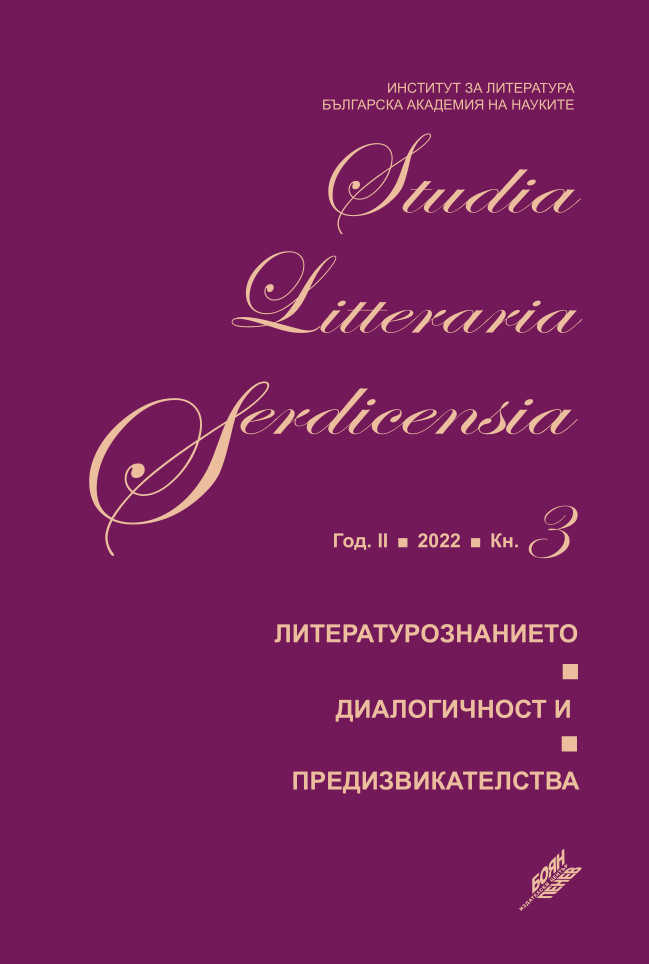The survey focuses on the Russian émigré spiritual and literary existence in Bulgaria during the period after the Bolshevik revolution in 1917 – an existence fed by concern in the fate of Russian culture in post-revolutionary, soviet Russia. It speculates on the possibilities of creating culture and literature in emigration, on the meaning of the creative act when the artist is forcibly deprived of his homeland and his readers. The research work has taken notice of connections with the local culture and the natives not typical of the Russian Diaspora elsewhere. Russian writers and scientists show keen interest in researching our culture, in the similarities between the two nations’ spiritual lives and in parallel cultural phenomena. They turned out to be favorably disposed toward artistic and scientific research of Bulgarian history, culture and literature, which is easily recognizable when reviewing both emigrants’ and national book publishing and periodicals. Their translation of Bulgarian folklore, poetry and prose are essentially important for spreading Bulgarian works and culture to different parts of the world. At the time, Russian emigrants’ cultural invasion in Bulgaria was perceived by Bulgarian authors and intellectuals as something positive, as a catalyst for development of national literary and cultural processes and furthermore as an episode of a pre-existing tendency of Russian cultural influence penetrating Bulgarian reality. This unforeseen meeting with Russian culture, represented by Russian writers, dramatists and migrant-scientists creates many opportunities for positive impact on Bulgaria’s cultural and literary life.
Exile and literature. (On the literary life of Russian emigration in Bulgaria, 1920ties–1930ties)
-
YEAR: КНИГА 3PUBLISHED ON :
PUBLISHER: INSTITUTE FOR LITERATUREISSN (Print): 2738-7631ISSN (Online): 2815-2999
-
-
- NAME: Radostin Rusev
- INVERSION: Rusev, Radostin
- E-MAIL: [email protected]
- INSTITUTION: Institute for Literature – Bulgarian Academy of Sciences
- COUNTRY: Bulgaria
Радостин Русев е доцент, доктор по филология в Института за литература при БАН. Завършва Великотърновския университет „Св. св. Кирил и Методий“ (първа специалност „Руска филология“, втора специалност „История“) през 1986 г., като част от следването му (1983–1984) е в Държавния институт за руски език „А. С. Пушкин“ в Москва, Русия. От 1989 работи в Института за литература, където е последователно редовен докторант (1989–1992), филолог-проучвател (1992–1994), научен сътрудник ІІ ст. (1994–1998), научен сътрудник І ст. (1998–2003). От 1993 е доктор с дисертационен труд на тема „Валентин Распутин и „селската проза“ в съвременната руска литература“. От 2003 е доцент с хабилитационен труд на тема „Метафорите на постмодернизма в руската литература“. Научният му интерес е в областите руска художествена литература (ХХ и ХХІ век); българо-руски литературни диалози през ХХ век; култура и литература на руската емиграция в България (20-те и 30-те г. на ХХ век); постмодернизъм в литературата; литература и интернет; театър и литература.
Автор на монографията „С маска и няколко лица. Валентин Распутин и руската „селска проза“ (60-те–80-те г. на ХХ век) (2000)“. Отговорен редактор на енциклопедичния справочник „Периодика на руската емиграция в България 1920–1943“ (2012) и на редица научни сборници, ръководител на научноизследователски проекти, проучващи литературата на руската емиграция в България и руската литература в мрежата.
-
-
 ABSTRACT
ABSTRACTThe survey focuses on the Russian émigré spiritual and literary existence in Bulgaria during the period after the Bolshevik revolution in 1917 – an existence fed by concern in the fate of Russian culture in post-revolutionary, soviet Russia. It speculates on the possibilities of creating culture and literature in emigration, on the meaning of the creative act when the artist is forcibly deprived of his homeland and his readers. The research work has taken notice of connections with the local culture and the natives not typical of the Russian Diaspora elsewhere. Russian writers and scientists show keen interest in researching our culture, in the similarities between the two nations’ spiritual lives and in parallel cultural phenomena. They turned out to be favorably disposed toward artistic and scientific research of Bulgarian history, culture and literature, which is easily recognizable when reviewing both emigrants’ and national book publishing and periodicals. Their translation of Bulgarian folklore, poetry and prose are essentially important for spreading Bulgarian works and culture to different parts of the world. At the time, Russian emigrants’ cultural invasion in Bulgaria was perceived by Bulgarian authors and intellectuals as something positive, as a catalyst for development of national literary and cultural processes and furthermore as an episode of a pre-existing tendency of Russian cultural influence penetrating Bulgarian reality. This unforeseen meeting with Russian culture, represented by Russian writers, dramatists and migrant-scientists creates many opportunities for positive impact on Bulgaria’s cultural and literary life.

